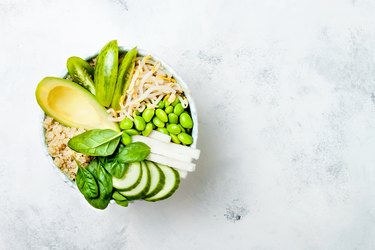
A vegan diet may help lower cholesterol and blood pressure, according to the AARP, but vegans also have nutritional concerns that aren't as prominent among those with a balanced, omnivorous diet. Nutrition experts don't agree on whether vegetarian and vegan diets are healthier than balanced diets that include meat and other animal products, but this doesn't mean being vegan is an unworthy goal. It does mean you need to be aware of the disadvantages of being vegan and work to minimize them to enjoy a nutritionally sound diet.
Need for Protein
Video of the Day
Meat, fish, eggs and dairy products are common sources of protein for most people. Americans who consume these foods typically get plenty of protein in their daily diets, but vegans need to turn to beans and nuts to get enough. The Centers for Disease Control and Prevention recommends 46 grams per day for women 19 and older and 56 grams daily for men. Tofu, beans and nuts are rich sources of protein for vegans. For example, a cup of dry beans has about 16 grams of protein, and a 100-gram serving, which is equal to about 1/2 cup, of extra-firm tofu contains just under 10 grams.
Video of the Day
Possible Iron Deficiency
Meat, particularly beef, and shellfish are rich sources of iron for omnivores, but it's important for vegans to consume iron-rich foods as well. Iron deficiency can lead to fatigue and problems with brain function. Females need 18 milligrams of iron daily between the ages of 19 and 50, but the requirement jumps to 27 milligrams for pregnant women. Men only need 8 milligrams daily. Breakfast cereals fortified with iron, soybeans, white beans and spinach are good sources of iron for vegans. Some vegans who don't care for iron-rich vegetables may need a daily iron supplement.
Getting Enough Calcium, Vitamin D and Vitamin B-12
Vegans need to eat plant sources of calcium, such as dark leafy greens or fortified soy products, to get the recommended 1,000 milligrams per day. Vitamin D helps the body absorb calcium, and adults need 600 international units per day. Vegans need to either take a vitamin D supplement or drink soy milk fortified with vitamin D. Most vegans need to take a vitamin B-12 supplement to get 2.4 micrograms per day since the vitamin is mainly found in animal products. Some soy milk and breakfast cereals are fortified with B-12.
Difficulty Eating Away From Home
A July 2012 Gallup poll reported that only 2 percent of Americans identified themselves as vegans. This means it's sometimes difficult to stick to a strict vegan diet since most of the country caters to those who eat animal products. It's often hard for vegans to eat out since many restaurants don't offer many vegan choices. Parties and family events can also be difficult, though vegans can minimize this challenge by bringing their own meals if they know there won't be any choices that conform to their dietary restrictions.
- AARP: 9 Pros and Cons to Going Vegan
- Centers for Disease Control and Prevention: Protein
- USDA National Nutrient Database: CANNELINI DRY BEANS, UPC: 728119430012
- Centers for Disease Control and Prevention: Iron
- Brown University Health Education: Being a Vegetarian
- Office of Dietary Supplements: Vitamin D
- Office of Dietary Supplements: Vitamin B12